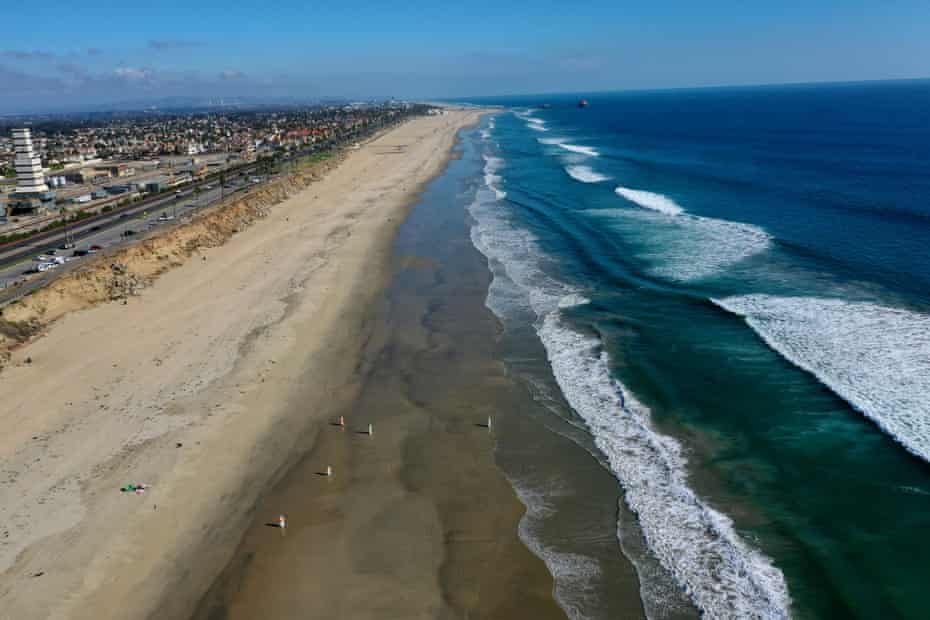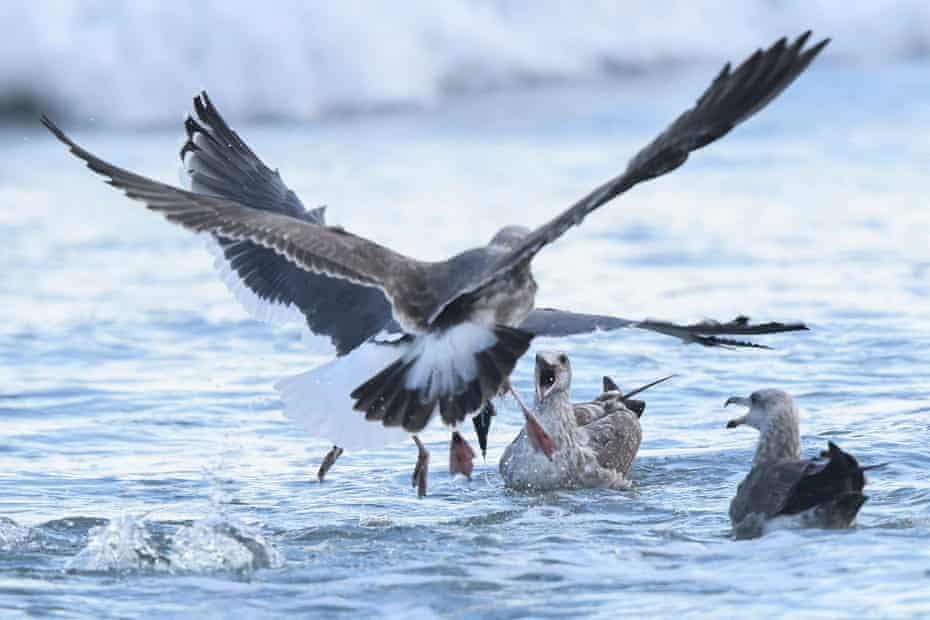The full scale of the ecological damage from the Huntington Beach oil spill will take some time to become clear, with birds and marine mammals hardest hit in the short term.
That’s the view of experts with experience of other incidents as they consider a suspected underwater pipe leak that spilled roughly 126,000 gallons of crude oil just miles off the southern Californian coast.
“The recovery is going to be very uneven,” Steve Murawski, a fisheries biologist and marine ecologist at the University of South Florida, said.
Dead birds and fish reportedly washed up along the miles of black-splotched shore as rescue workers rushed to recover oiled animals. Seven birds have been saved from the scene and another, a pelican, had to be euthanized. So far, there are no official reports tallying fatalities of animals or invertebrates.

Murawski has spent years studying the effects of the Deepwater Horizon spill – the largest offshore spill in US history, which dumped 134m gallons into the Gulf of Mexico over 87 days in 2010, contaminating 1,300 miles across five states. Thousands of animals perished in that spill and the effects can still be seen and felt today, more than a decade later.
The situation unfolding in Huntington Beach is not on the same scale as the Deepwater Horizon disaster but there are still important takeaways and lessons learned, Murawski said.
He said birds and marine mammals will be harmed, especially those that congregate along southern California’s offshore islands or pass through its coastal wetlands. Smaller creatures like plankton could take a hit, but their fast lifecycle will likely ensure they bounce back quickly. “The longer alive and the slower growing things, like abalone and other things that can’t get out of the way,” he said, “that might be more problematic.”
The effects could be felt long after the sand is cleared of the black sludge, especially in the affected marshes and wetlands – critical habitats for migratory and shorebirds and several endangered species.
Researchers have found that oil deposits don’t always float. Tar balls can find their way into underwater sediment or collect against sand banks where the waves crest near the shore, complicating cleanup efforts. Winter storms may continue to drudge up contamination long after the spill is contained.
“You will have to go through a number of rounds of beach cleanup and every time you have a storm you are going to see those tar balls back up on the beach,” Murawski said, noting that British Petroleum, the company responsible for Deepwater Horizon, was pulling up huge nets of tar and sand for years after the disaster. “I would imagine that that’s going to be a persistent headache for the people who are supposed to clean the beach up.”
Clearing oil from the sand and surface waters is a somewhat straightforward process, but it gets far more complex in the delicate marshes and wetlands. These areas, which arehome to a diverse array of species including migratory birds and endangered plants and animals, might be permanently affected by the oil spill.
“Once the oil is in the marsh and it gets down below the level of the sediments,” Murawski said, “it is there pretty much forever.”
Oil has already seeped into three marshes operated by the Huntington Beach Wetlands Conservancy, a local nonprofit that restored them to the refuges they are now. “It is heartbreaking,” said John Villa, the executive director, lamenting the efforts he and others have gone through to keep their 127 acres of preserves pristine.
After hearing reports of the spill on Saturday, he jumped into action, trying to stop the spread of the sheen at the shoreline. He and Orange county public works officials created a berm out of sand to block the contaminated water from entering the marshes – but it was too late. “Some of the oil still came in and it is still seeping in,” he said, adding that they are working to clean the water to the best of their ability.
The Huntington Beach Wetlands Conservancy, which includes the Talbert, Brookhurst, Magnolia and Newland marshes, cultivates a rich biodiversity. Between 85 and 90 species of birds call the wetlands home or stop there along their migratory routes, 10% of which are on the endangered or threatened species list, according to Villa. The organization also created a space where endangered plant species can thrive.
But over the weekend, the sheen could be seen in the shallows. Eelgrass, once growing in the water, was dead and floating to the sides. Villa is unsure about what the impact will be going forward, as more birds make their way into the area. Thousands of birds migrate through or overwinter in the area, including brown pelicans, Pacific loons, ospreys, and federally endangered western snowy plovers, who breed on the beaches, according to Audubon California.
Along with cleanup, there are concerns about how long the inlet can stay blocked before fish and plants in the marsh start to become starved of oxygen brought in salt water flows from the ocean. “Do we open up the inlet, which means we could get more contaminated salt water in there?” he said. “That’s a careful dance.”

Tiny exposures, deadly impacts
It only takes a tiny amount of exposure for a seabird to succumb, according to researchers. In a 2020 report on the effects on the Refugio Beach Oil Spill – which occurred in 2015 after a pipeline ruptured and poured more than 100,000 gallons of crude near Santa Barbara – researchers found that all it takes is an amount the size of a nickel to kill some species that forage in the water.
“Like a hole in a wetsuit, the oil destroys the feathers’ ability to insulate the bird, thus allowing cold ocean water to spread against the bird’s skin,” the report said. “Birds that contact oil typically die of hypothermia and starvation.” Because many birds preen, using their beaks to clean their feathers, they are also at higher risk of ingesting the toxins. Others may be rendered immobile if their feathers are smothered in sticky substance.
Researchers documented close to 560 bird deaths in the aftermath of the Refugio Beach Oil spill, spanning 28 different species. The actual toll is believed to be even higher.
Some populations of birds were affected not by deaths but by births. The western snowy plovers – tiny, rotund, endangered dune-dwellers – were exposed on the beach or when foraging in contaminated shallows or around washed-up kelp. In the first breeding season after the spill, scientists noted their egg infertility rate quadrupled and close to 10% of eggs were unviable.
Hundreds of invertebrates – from hermit crabs to sea stars – perished in that spill as well.
The extent of the ecological damage from the 2015 spill has only recently begun to come into focus and researchers expect the impact from this new spill may also take years to understand.
“It is really impossible to effectively clean up an oil spill,” said Miyoko Sakashita, director of the the advocacy organization Center for Biological Diversity’s oceans program, adding that she was devastated to see the oil reach sensitive habitats. “Birds migrate through there and use it for nesting and resting,” she said. “It is going to have longstanding impacts on a lot of the animals – we are going to see oil damaging beaches and ecosystems for many years to come.”


Comments